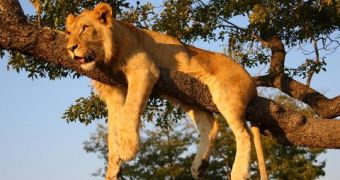The international conservation journal Orynx recently published the findings of a study carried out by conservationists working with Panthera and the IUCN Cat Specialist Group.
According to this investigation, projects aimed at reintroducing captive lions into the wild should be dropped altogether, as they do not really help with boosting the headcount for this species.
Apparently, over the past two decades, the regions in Southern Africa witnessed an increase in captive lion reintroduction programs.
Furthermore, some lions are bred and made to interact with humans willing to pay for so-called “wildlife encounters.”
Although it can be argued that such programs help raise some awareness with respect to the need to protect this species, little is in fact being done to help the lion population roaming free in the wild.
Turning back to the question of reintroducing captive lions into various regions, it seems that, as opposed to truly wild big cats, these ex-captive felines simply don't have what it takes to make it on their own once they are set free in what should be their natural habitats.
More precisely, since they lacked proper learning opportunities when they were just cubs, these lions do not possess the skills to hunt efficiently and keep themselves out of harm's way.
Panthera's website quotes Dr. Luke Hunter, who recently explained how, “The simple fact is, 'lion encounter' type programs do little to help conserve wild lions.”
Speaking about the research he recently participated in, he further argued that, “We show that any sincere effort to re-establish lions simply has no reason to resort to captive animals; wild lions are already much better equipped to be wild. Releasing captive animals unnecessarily increases the costs, risks of failure and the danger - to both lions and humans.”
To make matters even worse, their study also found that said “wildlife encounter” programs more often than not divert attention and funding from conservation projects which are actually successful in safeguarding our planet's remaining lion population.
Given the fact that, over the years, lions lost as much as 80% of their natural habitats as a result of expanding human society, it seems to us that all efforts to preserve this species need indeed be properly channeled.

 14 DAY TRIAL //
14 DAY TRIAL //